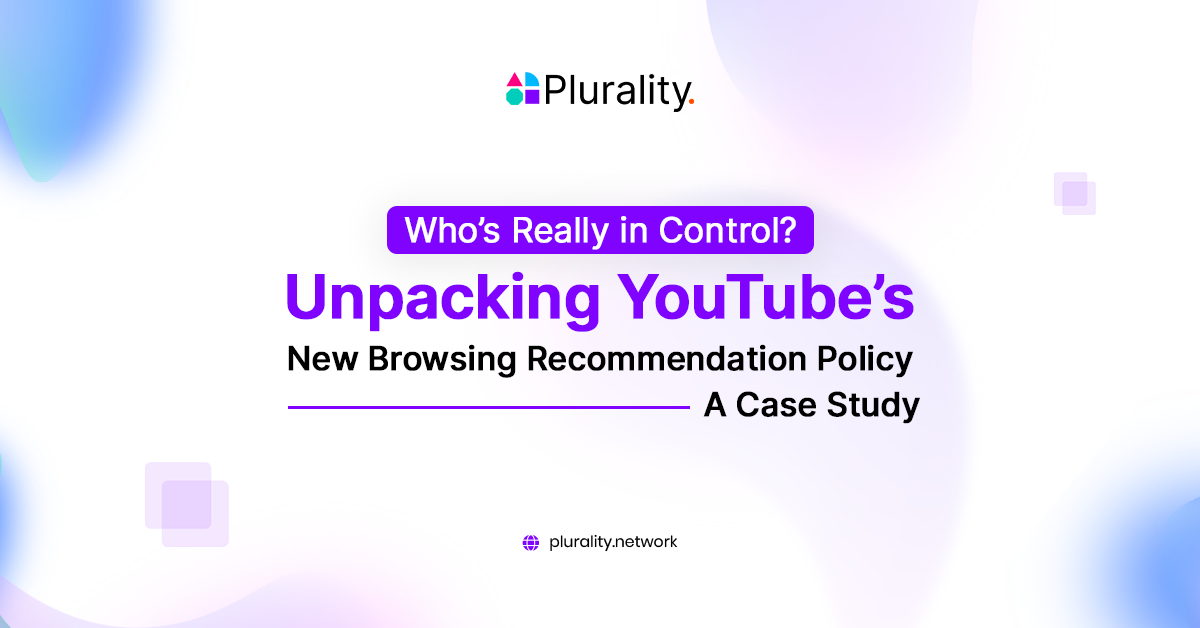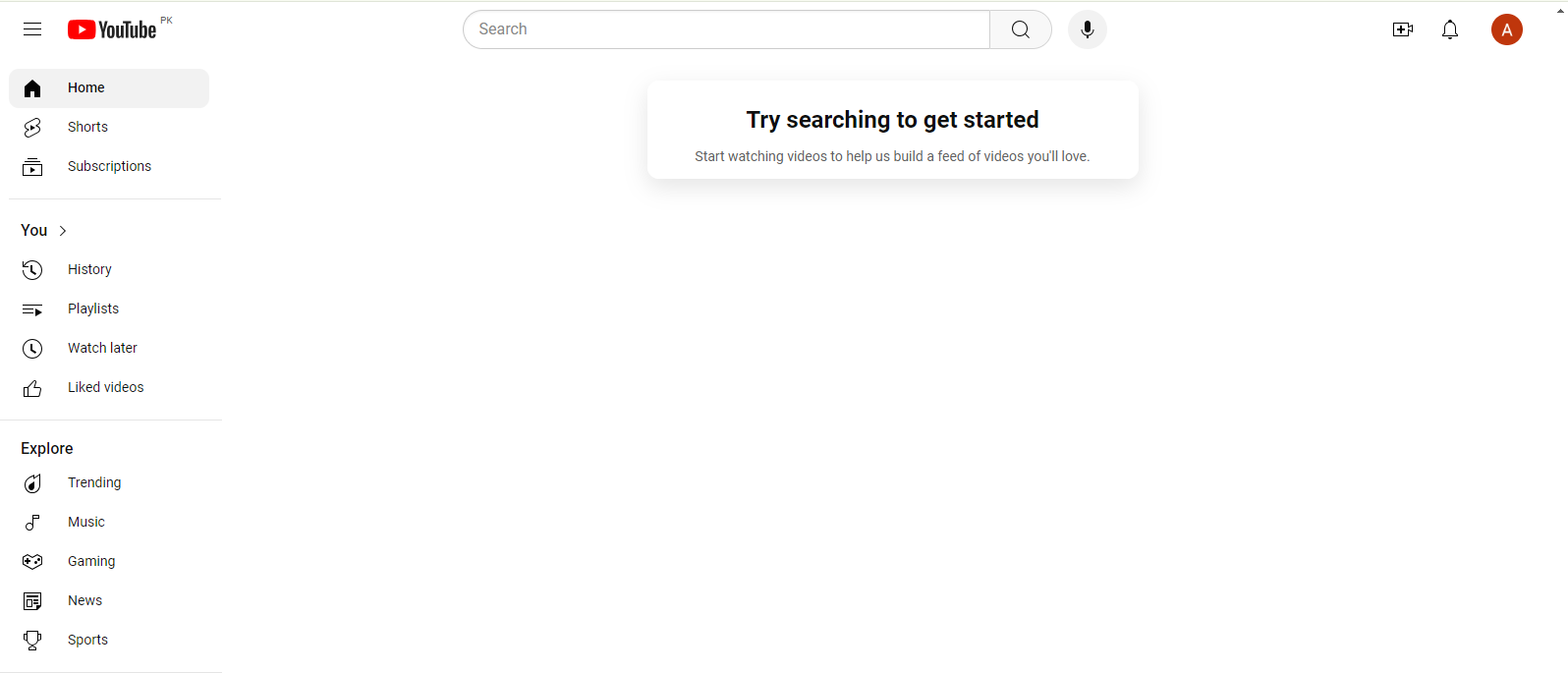Who’s Really in Control? Unpacking YouTube’s New Browsing Recommendation Policy - A Case Study
By Alev • August 27, 2024

With a commanding 78.85% market share among online video platforms, YouTube is undeniably one of the largest streaming platforms on the internet today. With over 2.7 billion active users monthly, it’s the second most popular social media platform worldwide, only trailing Facebook.
One key feature driving such massive user engagement and retention is YouTube’s recommendation algorithm, which suggests content based on a user’s viewing history, interests, and interactions.
Interestingly, recommendations are not just about showing users what they might like; they’re a critical tool for retaining users’ attention as soon as they land on the site. This tactic aligns with the “7-second rule” in web design, which posits that visitors should understand what a site offers within the first few seconds of visiting.
Recent Policy Changes Regarding Recommendations
Recently, the giant video-sharing service YouTube changed its policy to not give personalized video recommendations to unregistered and anonymous users. This is quite the opposite of YouTube’s previous policy, where even non-registered users were given default customized recommendations based on trending topics or generic popularity.
Privacy vs. Personalization: The Digital Tightrope We All Walk
Changes in recommendation policy point towards the rugged terrain of balancing privacy and personalization.
Privacy Concerns: By not recommending videos to visitors who are not logged in, the tracking of user behavior without their consent is avoided. The approach makes a pitch for enhanced public concerns over data privacy and the ethical use of personal information.
Personalization Trade-offs: On one hand, not providing recommendations can negatively impact user experience, but relying on personalized suggestions raises concerns about user privacy. YouTube’s algorithms need user data to offer relevant content suggestions, which can improve user engagement but erode privacy.
Impact on User Experience
Engagement Levels: This new policy could result in non-logged-in users being less engaged, since the recommendation would not be personalized and the content discovery would not be dynamic. Because of this, engagement with content and time spent on the platform will decrease.
Default Content: Although not personalized, the earlier displaying of default recommendations gave the user some say on the content to be viewed. Without this, casual YouTube users may find emptiness or lack of interest.
Did you know that 76% of users feel frustrated if a platform does not offer personalized recommendations? This statistic highlights how crucial tailored content is to maintaining user satisfaction and engagement on digital platforms. (DemandSage)

A Brief History of YouTube’s Recommendation Policies
YouTube’s recommendation system has evolved significantly, reflecting a constant balancing act between user engagement and privacy concerns. Here’s a summary of the significant changes and their impacts:
| Policy Change | Year | Impact on Users | User Reaction |
| Default Recommendations for All | Pre-2023 | Non-logged-in users received generic recommendations, optimizing engagement without requiring sign-ins. | Mixed: Some users appreciated the content discovery, while others desired more personalized experiences. |
| No Recommendations for Users Without Watch History | Early 2023 | Users who turned off their watch history were excluded from recommendations, leading to concerns over the need for personalized content. | Negative: Many users expressed frustration over the limited content discovery. |
| Reintroduction of Recommendations with Privacy Options | Late 2023 | YouTube reinstated recommendations for users with a watch history, emphasizing user consent and data protection. | Mixed: Some users appreciated the return of recommendations, while others were anxious about privacy implications. |
| No Recommendations for Non-Logged-In Users | 2024 | Non-logged-in users no longer receive recommendations, increasing awareness of data consent requirements. | Mixed: Privacy-conscious users welcomed the change, while others missed the ease of content discovery. |
Details and Implications
Initial Recommendations for Non-Logged-In Users
In the early days, YouTube offered default content recommendations to all visitors, regardless of whether they were logged in. This strategy kept users engaged by showcasing trending or popular content without needing personalized data. It was a win for YouTube’s side of the platform but left some users craving more tailored experiences.
Pushback on Privacy
By early 2023, YouTube faced criticism for stopping recommending videos to users who had turned off their watch history, even if logged in. This shift was meant to respect user privacy, but many found it limiting, as it cut off their access to personalized content—a critical feature that many had come to rely on.
Read what users are saying about this on Twitter:
youtube has completely disabled homepage recommendations if you don’t have watch history turned on
— T9 (@Thafnine) August 16, 2023
you won’t get any videos recommended to you anymore on the homepage until you turn it on pic.twitter.com/wJDLQYUI9t
new youtube bug puts every single video you get in your recommended into your history pic.twitter.com/1FpXNG5Yiy
— danielle🍋🌸 (@fyridk) April 28, 2023
Reintroduction of Recommendations
In response to user feedback, YouTube reintroduced recommendations later that year, emphasizing privacy and user consent more strongly. Recommendations were turned back on for users with a watch history, acknowledging that while confidentiality is essential, many users prefer personalized content to enhance their browsing experience.
YouTube needs a “I’m having friends over” button that changes your recommended page to Hells Kitchen clips or whatever. Nothing worse that turning on the Chromecast after a blunt and the recommendations are like 7 NL Balatro episodes and a 5h deep dive into Mario 64 stair physics
— pChal (@pChalTV) May 31, 2024
Recent Changes and User Consent
In 2024, YouTube made a significant move by deciding not to provide any recommendations to non-logged-in users. This change aligns with a broader trend toward prioritizing user consent and data protection. It also underscores the platform’s struggle to balance user engagement with privacy.
User Feedback and Sentiment
User reactions to these changes have been varied:
- Privacy Appreciation: A segment of users has embraced YouTube’s increased focus on privacy, especially those wary of data collection.
- Frustration with Content Discovery: On the other hand, many users need to catch up on the serendipitous discovery of new content and which recommendations are provided. This frustration is frequently expressed on platforms like Reddit and Twitter, where users discuss their diminished browsing experience.
This constant balancing act makes one wonder whether the two sides of the coin are equally important. And if so, which side should a platform focus on? This also begs the question of whether platforms are always doomed to pick sides. Can there be better technological alternatives out there?
The Parallel Story of Plurality Network
At Plurality Network, we have tasked ourselves with finding the right balance between privacy and personalization.
With decentralized technologies becoming more ubiquitous and viable, it is now possible to provide users with better experiences while respecting their privacy.
Using decentralized technologies for balancing privacy and personalization
User Empowerment: Plurality uses decentralized technologies to ensure that users would have better agency over their information and when/how the platforms use it. This means that users can opt-in for personalized experiences while still being sure that exactly which of their data is being used for exactly which purpose. This creates a superior tech that empowers people and balances privacy and personalization, a balance that platforms like Youtube are still finding hard to achieve.
Ethical Data Practices: We pledge to uphold a business requirement within the industry that calls for transparency and user consent. By putting agency into the hands of users, we establish trust and drive deeper engagement, without data misuse concerns.
Improving User Experience
Personalization Without Compromise: Like YouTube’s challenge, Plurality Network also seeks to deliver richly personalized experiences while respecting user privacy. Our platform aims to balance such aspects through decentralized data management and transparent practices.
Innovative Solutions: We aim to improve the experience without compromising privacy by using privacy-preserving, open algorithms that show users relevant content.
Industry Trends and Future implication
Privacy and data protection
The focus on user privacy reflects the industry’s overall interest in data protection. As GDPR and CCPA are more widely adopted and the regulations become more stringent, platforms will rethink how they gather and use user data.
Future of Personalization
Focus on less intrusive data aggregation techniques: The platforms will need to find alternative methods by which they can personalize without relying on the user’s data all too much. Methods where contextual recommendations or aggregated data insight approach would be more common.
Third-Party Cookies: As third-party cookies will be eliminated at the end of the year, platforms need to devise techniques to maintain user engagement without having access to data that was previously collected through cookies.
Open Algorithms
A crucial piece of this balance is to create open algorithms that provide users with a choice of what data they want to share and how much personalization they need to experience, an area that still needs much progress.
Conclusion
YouTube’s recent updates on the recommendation system highlight the fine line between a user’s privacy and personalization.
By ending recommendations by default for logged-out users, YouTube follows the industry trend towards greater privacy while buckling under the pressure of filtering waves of users. It continues to need help with strategies to satisfy these users.
Plurality Network is committed to tackling these challenges. By being oriented toward decentralized data management that focuses on user privacy, we are positioning ourselves with the industry’s shift toward better data protection.
We are putting the agency in the hands of our users by innovating in personalization methods to promote privacy and a better user experience.
The evolution of YouTube’s recommendation algorithm underlines how important finding practical solutions is to dilemmas respecting users’ privacy and creating an engaging experience.
Plurality Network’s approach—empowering the user by allowing them actual custody over their data and giving them agency to decide when and to whom to share data will be relevant to addressing these challenges and creating a more balanced and ethical digital ecosystem.



